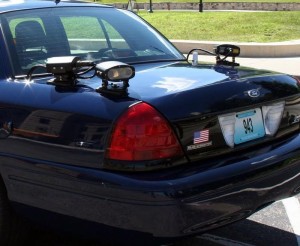Cops & Data Collection: Lawsuit Challenges Virginia Cops
Right now in the U.S. there is a serious focus on the police. As black people we know this was long overdue. But the scrutiny has to go beyond police action on the streets. More and more attention had been focused on police data collection.
In Virginia a man is suing the County of Fairfax over their collection of license plate data. Fairfax resident Harrison Neal, filed the suit after he learned that his license plate had been scanned by an automatic license plate reader twice last year and stored in a police database. Neal was not a suspect in any criminal investigation. The lawsuit was filed by the American Civil Liberties Union of Virginia on behalf of Neal last Tuesday.
Neal filed a public records request and discovered images of his car in the database maintained by the Fairfax Police Department. In response to his request he received two sheets of paper containing an image of his car. He also received a chart indicating the times and dates the images were taken along with a map revealing street locations believed to be where the reader was when it snapped the images.
Other individuals have sued before to obtain records stored in police databases. However this is the first known case targeting a law enforcement agency over an alleged illegal use of a database.
The complaint (.pdf) asserts that the database violates a Virginia law entitled the Government Data Collection and Dissemination Practices Act. The law bars government agencies from collecting, storing, or disseminating the personal information of individuals unnecessarily.
The topic of automatic license plate readers has heated up recently. Some have related the use of the readers to the government’s warrantless use of GPS trackers, stingrays or IMSI catchers used to track the location of cars, cell phones and other mobile devices.
The readers, often mounted on police vehicles or in a fixed location, use cameras and optical character recognition technology to take images of license plates. The images are stored in searchable databases. Insurance agencies, vehicle re-possessors, impounders and others use them to locate stolen vehicles or vehicles belonging to people who are behind on their payments. But law enforcement agencies also use them.
Civil liberties and privacy groups oppose the readers and databases as a violation of privacy. They believe that it’s possible to gain a person’s personal information simply by tracking the location of their car over a period of time. The readers also collect much more than just license and location data. California computer security consultant Michael Katz-Lacabe discovered local authorities in his San Francisco Bay Area town had in their possession images of his two cars 112 times. In the database was one image taken in 2009 that clearly showed him and his two daughters exiting one of the cars while it was parked in their driveway.
Proponents of the technology argue that it is no more harmful to a person’s privacy than cell-phone location information.
Terry Jungel, executive director of the Michigan Sheriffs’ Association said “We’re not insensitive to people’s right to privacy,” in 2013 over a battle in his state about license plate databases. “If Big Brother is going to abuse information, there’s better information to abuse than this.”
Virginia’s state law should have prevented Neal’s images from being stored. The State Attorney General, in February 2013, issued an opinion advising the State Police that automatic license plate readers do collect personal information. In accordance with the law, agencies cannot legally collect and store data unless it’s related to a specific criminal investigation. It was discovered that Virginia State Police had used license plate readers in 2008 at political rallies for both Sarah Palin and Barack Obama. The readers were used to collect information about people who had attended the rallies triggering the attorney generals pronouncement.
As a result the Virginia State Police stopped storing license plate records and instituted a policy of deleting such information within 24 hours after being collected by a reader, unless the information is relevant to a criminal investigation.
But the ACLU of Virginia claims that other government agencies in the state have failed to heed the order. The Fairfax Police Department, in particular, stored license plate images for up to a year without reason.
Fairfax also has an agreement with nearby Maryland and Washington D.C. law enforcement agencies to share information collected in its database.
“Like many other technologies, ALPRs have legitimate law enforcement uses,” Rebecca Glenberg, legal director of the ACLU of Virginia said in a statement. “We do not object to the real-time use of ALPRs to compare license plate numbers to a current ‘hot list’ of vehicles involved in current investigations. The danger to privacy comes when the government collects tens of thousands of license plate records so it can later find out where people were and when. The intrusion is magnified in the Washington, D.C. area, where multiple law enforcement agencies may access each other’s information.”






